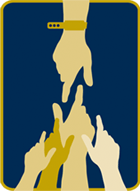This month, Friends@NIH had the chance to sit down and chat with Dr. Lori Wiener, co-chair of the Behavioral Health Core at the NIH where she coordinates the Psychosocial Support and Research Program within the Pediatric Oncology Branch. Dr. Wiener provides counseling to the children, family members, siblings, donors, adolescents and young adults who are affected by NIH clinical trials and conducts research aimed at improving the cancer experience.
“We focus on quality of life for patients receiving treatment at the clinical center,” says Dr. Wiener. “In this capacity, I help develop and carry out studies that look at how kids cope, with the goal of developing new materials, new resources and new interventions.”
In her role, Dr. Wiener speaks with families whose children have been diagnosed with life-threatening conditions. She says she often encounters situations in which the families come to the NIH desperate to find treatment to help their child, looking for resources that their home communities do not have. This comes with a big degree of uncertainty, as they wait to learn whether their child will qualify for one of the clinical trials.
In addition to undergoing treatments and participating in protocols, patients also have to manage the realities of day-to-day life back home: utility bills, family expenses, mortgages and more. According to Dr. Wiener, there are families who go to great lengths to participate, including refinancing their homes or filing for bankruptcy.
These life-threatening conditions impact the lives of people of all ages, including adolescents and young adults. It is this group that Dr. Wiener says often “falls through the cracks.”
“We need to think about the unique emotional needs of adolescents and young adults,” says Dr. Wiener. “[There was] a young man who was planning not to come back and finish his treatment because he lived with his girlfriend and he couldn’t leave her without a place to live. So we applied to Friends@NIH and we received three months covered so that he was able to get through his treatment.”
Lastly, Dr. Wiener discusses the importance of organizations like Friends of Patients at the NIH, “Organizations like Friends@NIH help us to provide financial assistance so these families can place their energy on their child and family and less so on financial issues such as having their care being taken away, their utilities being turned off or getting threatening late notices… Knowing immediate bills will be covered is a tremendous gift that we can give these families. There are no words to be able to describe the relief this provides.”
We here at Friends of Patients at the NIH believe that it is important to provide support for the patients and families undergoing these trials and treatments at the NIH. We encourage you to find way to get involved with our organization and become a friend!




